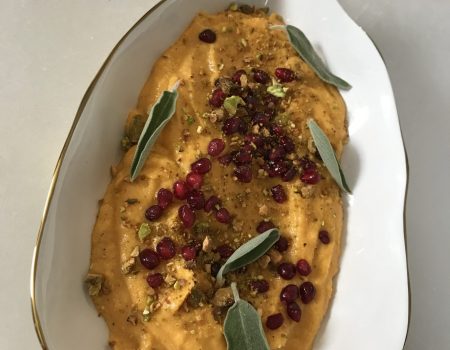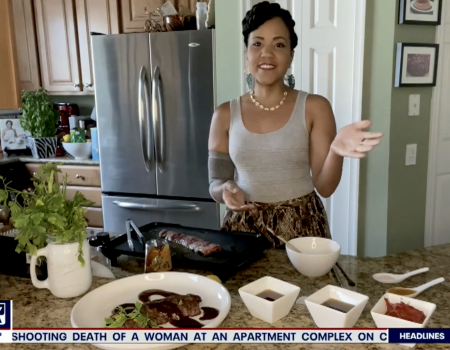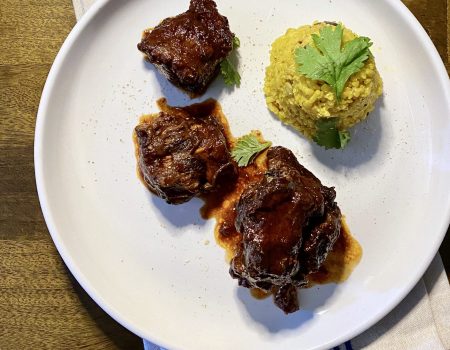“Soon there will be nine billion of us on the planet. Our societies must grow to meet our needs, so we can put enough food on the table for everyone.” — OXFAM
When it comes to food, access to healthy food and our global issue with poverty, I throw myself into kitchen of too many cooks to do something about it. Coming from a poor and destitute island where people still starve, have to resort to stealing from others, including their neighbor, to get a decent amount of food for the day, or simply make do with the little they have, I’m a very compassionate cook and educator on the topic. A true story that horrifies me, and something that caused island-wide uproar and imposition of fines and jail time for the perpetrators. Back in the late 90s, during a spell of scarce food resources, some Cubans, mostly in Havana, took to the streets selling staples like ropa vieja. Traditionally, ropa vieja is made with pulled flank steak and robustly seasoned with herbs, spices and cooked in a hearty wine and tomato sauce. The controversy and crime came when people started selling ropa vieja made out of shredded mop scraps; as in the mop you use to clean your floor. The achieved consistency was almost undistinguishable and so the every day person who was trying to figure out what their next meal would be didn’t question its integrity and on good faith, purchased and ate it. I’m not certain how the ratchet deception was discovered.
(Traditional ropa vieja with arroz congri)
This was a temporary crisis in Cuba, but sadly, it’s not so uncommon in other parts of the world where the food climate is far worse. Look at Haiti and most countries in Africa. Even parts of the U.S. are affected by an unfair food society.
Over the course of my career as a chef and food enthusiast, I’ve joined certain organizations that promote the expansion of initiatives that will stave off the problems and bring those vital issues to the fore of policy and change. I’ve always felt there’s something I can do. While every organziation has a different mission and approach, the end goal is the same: to obliterate hunger and see that not a single soul goes to bed hungry.
I recently became familiar with Oxfam and their GROW campaign. Oxfam is an international confederation of 17 organizations networked together in more than 90 countries, as part of a global movement for change, to build a future free from the injustice of poverty. They work directly with communities and seek to influence the powerful to ensure that poor people can improve their lives and livelihoods and have a say in decisions that affect them.
GROW is the food arm of Oxfam where their purpose is to ensure food justice and preservation of equitable ideology. That means to make sure the world is fed. That resources, access, information, and ethical practices are in place in order for a healthy food system to thrive. They’ve identified some real issues in the current system, principally food and oil prices, flatlining yields, climate change, gender inequality and land grabs — all which have an adverse affect on productivity and viability.
Their plan is a 5 method one which we can all apply in our daily lives. I’ve taken personal charge and interest in sacrificing certain things and applying these principles and practices to my personal and professional life. Some of them have happened by default as part of my lifestyle; others I’ve introduced as I become more aware and driven to help make a difference.
This is the GROW method, all of which I’ve been practicing to some agreeable degree.
My use of the pressure cooker is one of the biggest ways I can impact our food culture and system. If you follow Flanboyant Eats, you know I’m passionate about its benefits, one being energy efficiency. I’m using less water and less energy every time I cook with one of my pressure cookers and I’m a testament to the difference it makes in the quality of food we consume. It also allows for a reduction in food waste. When I was teaching cooking classes, one of the strong points I’d make to my students is that nothing goes to waste in my kitchen. There’s use for everything we use, even if down to the onion skin you think had no use.
Buying foods in season is something any chef will encourage. Tomatoes for instance are not in season right now in the US. Most conscious chefs and restaurants will not offer or serve out of season food. If you have to use tomatoes, opt for canned… they’re not as bad as we may think.
Eating less meat. Truthfully, I didn’t start doing this out of global consciousness, rather out of love for my body and a tad bit of laziness at home. It’s far easier for me to grill or sear fish than to season beef the way I like and that’s resulted in a tremendous cutback of my meat intake over the last 7 or so years. I’m not an advocate for eliminating it completely, but I’m more and more convinced that minimizing it is beneficial all the around.
My second best and most committed effort to adhering to GROW’s principles is buying fresh and locally. When in Atlanta, I was lucky enough to be walking distance to an international farmers’ market where I was able to buy from local producers and ask questions what would make my purchasing more sensitive. Now in DC, I’m surrounded by different open air markets where the farmer’s are out every day, selling their product and passionately sharing their stories. There’s nothing like taking double action in buying local but also supporting the farming industry. The effects of buying local and sustainable have a direct impact on fair buying and pricing practices.
(Local vendor in central Virginia during annual balloon and wine festival)
(Friendly apple farmer in Virginia; see this recipe with food I made with his apples)
These are few, but rewarding ways I engage in seeing our communities, both national and global, are assisted in making it a fair playing ground for everyone. I’m convinced there’s something we can all do, even if it starts with eating less in one day.
When I was a kid, my parents used to make me eat everything on my plate, arguing that our family in Cuba was starving. I didn’t get it. I rebutted with pointing out that we lived in the US and food was in abundance. We could go to any grocery store at any time and buy however much we needed or wanted. I get it now. It’s not that black and white.
Helping, however, is.
Would love for you to check out more about about Oxfam, GROW and their other campaigns.

Eat well, love unapologetically, pray with true intention, and take care of yourself.





















10 thoughts on “How I Like To GROW…And Help Billions of Those in Need of Food”
A great method! Something I’ve always done… Congrats on follow this method.
Cheers,
Rosa
Wow, this is useful information. I definitely have started to use only in season fruits and veggies when preparing meals at home. I have been eating a lot more fish as well. I will have to invest in a pressure cooker.
I love that you are always lending a helping hand when you can Bren and bringing a much needed charity to our attention. Hunger is more widely spread than we could ever imagine in our own backyards.
I have been looking for an excuse to invest in a pressure cooker! Great post!
Cookin-Cookin, with the Pressure ON! And a Wonderful Organization.
718229 836013This is often a wonderful blog, could you be interested in working on an interview about just how you developed it? If so e-mail myself! 917137
201769 68363I truly like your writing style, amazing data, thankyou for posting : D. 406069
58125 117178Hi my friend! I want to say that this post is awesome, nice written and contain almost all significant infos. Id like to see a lot more posts like this . 672501
446794 895370I was reading via some of your content on this internet internet site and I believe this internet site is truly instructive! Keep putting up. 261851
Espectro de vibracion
Dispositivos de calibración: clave para el rendimiento suave y efectivo de las dispositivos.
En el ámbito de la avances actual, donde la productividad y la seguridad del aparato son de gran trascendencia, los sistemas de balanceo tienen un papel crucial. Estos dispositivos adaptados están concebidos para calibrar y estabilizar piezas rotativas, ya sea en dispositivos de fábrica, vehículos de traslado o incluso en equipos hogareños.
Para los técnicos en conservación de dispositivos y los ingenieros, utilizar con equipos de calibración es importante para promover el operación uniforme y confiable de cualquier sistema dinámico. Gracias a estas soluciones tecnológicas innovadoras, es posible limitar significativamente las vibraciones, el sonido y la esfuerzo sobre los rodamientos, mejorando la tiempo de servicio de componentes valiosos.
Asimismo importante es el papel que tienen los sistemas de ajuste en la soporte al consumidor. El apoyo profesional y el reparación regular utilizando estos dispositivos habilitan ofrecer asistencias de gran nivel, incrementando la satisfacción de los consumidores.
Para los responsables de emprendimientos, la inversión en sistemas de equilibrado y medidores puede ser fundamental para aumentar la rendimiento y productividad de sus equipos. Esto es sobre todo relevante para los empresarios que dirigen reducidas y pequeñas organizaciones, donde cada detalle es relevante.
Asimismo, los sistemas de balanceo tienen una extensa utilización en el ámbito de la prevención y el supervisión de estándar. Facilitan identificar eventuales problemas, evitando reparaciones onerosas y perjuicios a los dispositivos. Incluso, los información generados de estos dispositivos pueden aplicarse para optimizar métodos y aumentar la reconocimiento en plataformas de búsqueda.
Las campos de utilización de los equipos de calibración abarcan múltiples áreas, desde la producción de bicicletas hasta el seguimiento ecológico. No interesa si se considera de grandes elaboraciones productivas o modestos locales caseros, los aparatos de calibración son necesarios para garantizar un rendimiento efectivo y sin riesgo de interrupciones.